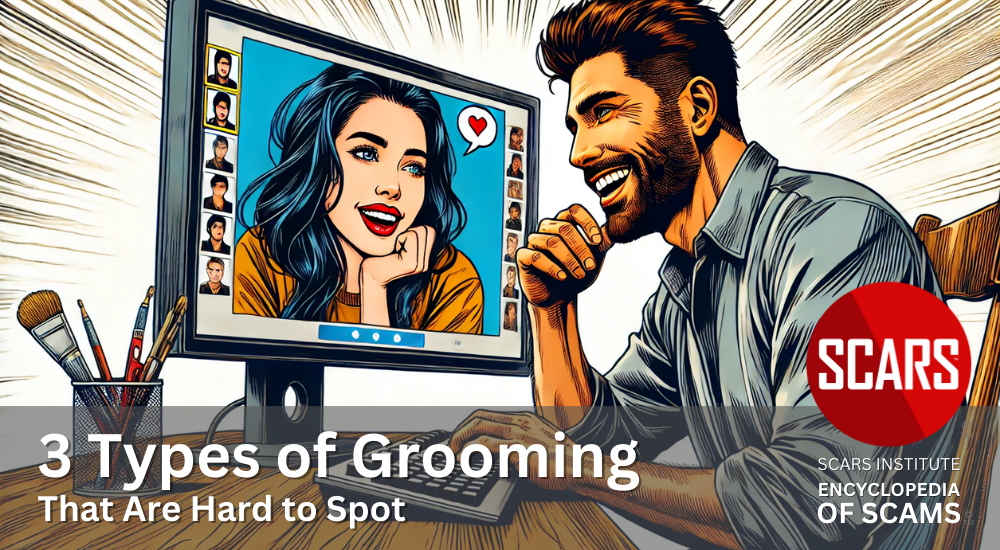
SCARS Institute’s Encyclopedia of Scams™ Published Continuously for 25 Years

The 3 Types of Grooming That Are Hard to Spot
Unseen Threats: Types of Grooming Even Adults Can Miss Online and How to Avoid Them
Scammer Techniques – A SCARS Institute Insight
Authors:
• SCARS Institute Encyclopedia of Scams Editorial Team – Society of Citizens Against Relationship Scams Inc.
• Vianey Gonzalez B.Sc(Psych) – Psychologist, Certified Deception Professional, Psychology Advisory Panel & Director of the Society of Citizens Against Relationship Scams Inc.
• Tim McGuinness, Ph.D., DFin, MCPO, MAnth – Anthropologist, Scientist, Director of the Society of Citizens Against Relationship Scams Inc.
Originally Published: 2012 – Article Updated: 2023
Article Abstract
Online grooming tactics used by scammers and abusers are increasingly difficult to detect, even for adults. Emotional grooming, financial grooming, and ideological grooming are subtle manipulation strategies that target individuals’ vulnerabilities, building trust before exploiting them.
Emotional grooming creates deep emotional bonds to control or exploit; financial grooming manipulates individuals into providing money or financial information; and ideological grooming leverages shared beliefs to radicalize or indoctrinate. To protect against these tactics, it’s crucial to maintain boundaries, stay vigilant, and critically evaluate others’ motives in online interactions.

Unseen Threats: The 3 Types of Grooming Even Adults Can Miss Online and How to Avoid Them
The 3 Types of Grooming That Are Hard to Spot—Even for Adults
Online grooming is a method used by scammers, abusers, and cybercriminals to manipulate and exploit individuals by building trust and emotional connections, often to achieve financial, sexual, or ideological goals. While most discussions about grooming focus on children and teenagers, adults are also at risk. In fact, adults can be more vulnerable than they realize, often due to loneliness, emotional distress, or misplaced trust. Here, we explore three hard-to-spot types of grooming that can trap even well-educated, experienced adults: Emotional Grooming, Financial Grooming, and Ideological Grooming. Understanding these methods and learning how to avoid them can help protect against online manipulation.
Type 1: Emotional Grooming
What It Is
Emotional grooming targets a person’s emotional needs, vulnerabilities, or desires for companionship. Scammers, or online manipulators, create a deep sense of connection and trust by feigning care, affection, or friendship. The perpetrator often plays on the victim’s emotions, providing comfort and understanding, especially during times of distress. For adults, this is particularly dangerous in romantic and friendship-based online platforms like dating apps, social media, or support groups.
How it Works
The groomer starts by establishing emotional rapport through consistent communication, listening attentively, and showing apparent interest in the victim’s life. Over time, they create a sense of emotional dependency. Once trust is solidified, the groomer may exploit the emotional bond for personal gain, such as money, control, or other forms of exploitation. In some cases, this can evolve into a more coercive relationship, where the victim becomes isolated from their real-life support systems, believing the groomer is their primary or sole source of support.
How to Avoid It
-
- Set emotional boundaries online: Be cautious about oversharing personal details with people you’ve only met online.
- Watch for red flags: Groomers often mirror your emotions to create a sense of trust. If someone seems too invested too quickly or too eager to please, this may be a warning sign.
- Verify the person’s identity: Conduct a reverse image search on their photos or search for inconsistencies in their stories. Also, avoid forming deep emotional bonds with someone you haven’t met in person.
Type 2: Financial Grooming
What It Is
Financial grooming involves exploiting someone’s financial vulnerabilities or dependency. Fraudsters pretend to be friends, romantic partners, or trustworthy business partners to establish a bond, eventually manipulating their victims into giving them money, gifts, or sensitive financial information.
How it Works
The groomer starts by discussing financial issues, either by hinting at their own money struggles or expressing concern over the victim’s financial situation. Over time, they gradually normalize discussions around money, often presenting small, innocuous requests such as borrowing a small amount of money. Once the victim complies, the requests grow larger, often under the guise of “helping a friend,” “investment opportunities,” or “a temporary need.” In romance scams, the groomer may convince the victim that they are in a serious relationship and need money for emergencies or investments, which they promise to repay.
How to Avoid It
-
- Keep financial matters private: Avoid discussing personal finances or sending money to someone you’ve only met online, no matter how trustworthy they seem.
- Stay vigilant for money requests: If someone begins hinting or directly asking for money, gifts, or your financial details (even after an emotional connection has been established), be cautious.
- Trust your instincts: If something feels off about financial requests, it probably is. Consult with trusted friends or family members before making financial decisions involving someone you only know online.
Type 3: Ideological Grooming
What It Is
Ideological grooming targets an individual’s belief system, whether political, religious, or social. This type of grooming often leads victims down a path of radicalization or indoctrination. Perpetrators build a connection through shared beliefs, then manipulate the victim to adopt more extreme views or take actions that serve the groomer’s ideological goals.
How it Works
Groomers start by identifying and engaging with individuals who share their broad ideology. Through prolonged discussions, the groomer gradually introduces more extreme ideas, framing them as “logical next steps” or “truths” that mainstream society ignores or suppresses. Over time, the victim becomes desensitized to radical or extreme viewpoints and is convinced to participate in harmful actions, such as sharing extremist content, attending rallies, or even engaging in illegal activities.
How to Avoid It
-
- Be aware of gradual changes in belief: Radical shifts in your worldview or adopting more extreme positions should prompt self-reflection. Ask yourself whether these new beliefs are truly your own or if you’ve been influenced by someone else.
- Verify information sources: Groomers often present misinformation as fact. Always cross-check sources and consider diverse viewpoints.
- Limit echo chambers: Engaging with a variety of opinions and perspectives can help prevent ideological grooming. Don’t rely solely on one group or person for validation of your beliefs.
Review
Grooming is a powerful tool of manipulation that can ensnare anyone, regardless of age or experience. Emotional, financial, and ideological grooming are particularly dangerous because they often go undetected until it’s too late. To protect yourself, maintain healthy boundaries, stay critical of people’s intentions, and seek outside perspectives if you notice someone trying to manipulate your emotions, money, or beliefs. The best way to avoid falling prey to these grooming tactics is through awareness, skepticism, and careful online behavior.
By recognizing these grooming tactics, adults can better safeguard themselves against online predators who prey on vulnerability. While it is crucial to trust others and form meaningful connections, remaining vigilant and setting boundaries online can protect against falling victim to emotional, financial, or ideological manipulation.
Statement About Victim Blaming
SCARS Institute articles examine different aspects of the scam victim experience, as well as those who may have been secondary victims. This work focuses on understanding victimization through the science of victimology, including common psychological and behavioral responses. The purpose is to help victims and survivors understand why these crimes occurred, reduce shame and self-blame, strengthen recovery programs and victim opportunities, and lower the risk of future victimization.
At times, these discussions may sound uncomfortable, overwhelming, or may be mistaken for blame. They are not. Scam victims are never blamed. Our goal is to explain the mechanisms of deception and the human responses that scammers exploit, and the processes that occur after the scam ends, so victims can better understand what happened to them and why it felt convincing at the time, and what the path looks like going forward.
Articles that address the psychology, neurology, physiology, and other characteristics of scams and the victim experience recognize that all people share cognitive and emotional traits that can be manipulated under the right conditions. These characteristics are not flaws. They are normal human functions that criminals deliberately exploit. Victims typically have little awareness of these mechanisms while a scam is unfolding and a very limited ability to control them. Awareness often comes only after the harm has occurred.
By explaining these processes, these articles help victims make sense of their experiences, understand common post-scam reactions, and identify ways to protect themselves moving forward. This knowledge supports recovery by replacing confusion and self-blame with clarity, context, and self-compassion.
Additional educational material on these topics is available at ScamPsychology.org – ScamsNOW.com and other SCARS Institute websites.
Psychology Disclaimer:
All articles about psychology and the human brain on this website are for information & education only
The information provided in this article is intended for educational and self-help purposes only and should not be construed as a substitute for professional therapy or counseling.
While any self-help techniques outlined herein may be beneficial for scam victims seeking to recover from their experience and move towards recovery, it is important to consult with a qualified mental health professional before initiating any course of action. Each individual’s experience and needs are unique, and what works for one person may not be suitable for another.
Additionally, any approach may not be appropriate for individuals with certain pre-existing mental health conditions or trauma histories. It is advisable to seek guidance from a licensed therapist or counselor who can provide personalized support, guidance, and treatment tailored to your specific needs.
If you are experiencing significant distress or emotional difficulties related to a scam or other traumatic event, please consult your doctor or mental health provider for appropriate care and support.
Also read our SCARS Institute Statement about Professional Care for Scam Victims – click here to go to our ScamsNOW.com website.
If you are in crisis, feeling desperate, or in despair please call 988 or your local crisis hotline.
-/ 30 /-
What do you think about this?
Please share your thoughts in a comment below!
Table of Contents
- Unseen Threats: Types of Grooming Even Adults Can Miss Online and How to Avoid Them
- Article Abstract
- Unseen Threats: The 3 Types of Grooming Even Adults Can Miss Online and How to Avoid Them
- The 3 Types of Grooming That Are Hard to Spot—Even for Adults
- Type 1: Emotional Grooming
- Type 2: Financial Grooming
- Type 3: Ideological Grooming
- Review
LEAVE A COMMENT?
Thank you for your comment. You may receive an email to follow up. We never share your data with marketers.
Recent Comments
On Other Articles
- on Love Bombing And How Romance Scam Victims Are Forced To Feel: “I was love bombed to the point that I would do just about anything for the scammer(s). I was told…” Feb 11, 14:24
- on Dani Daniels (Kira Lee Orsag): Another Scammer’s Favorite: “You provide a valuable service! I wish more people knew about it!” Feb 10, 15:05
- on Danielle Delaunay/Danielle Genevieve – Stolen Identity/Stolen Photos – Impersonation Victim UPDATED 2024: “We highly recommend that you simply turn away form the scam and scammers, and focus on the development of a…” Feb 4, 19:47
- on The Art Of Deception: The Fundamental Principals Of Successful Deceptions – 2024: “I experienced many of the deceptive tactics that romance scammers use. I was told various stories of hardship and why…” Feb 4, 15:27
- on Danielle Delaunay/Danielle Genevieve – Stolen Identity/Stolen Photos – Impersonation Victim UPDATED 2024: “Yes, I’m in that exact situation also. “Danielle” has seriously scammed me for 3 years now. “She” (he) doesn’t know…” Feb 4, 14:58
- on An Essay on Justice and Money Recovery – 2026: “you are so right I accidentally clicked on online justice I signed an agreement for 12k upfront but cd only…” Feb 3, 08:16
- on The SCARS Institute Top 50 Celebrity Impersonation Scams – 2025: “Quora has had visits from scammers pretending to be Keanu Reeves and Paul McCartney in 2025 and 2026.” Jan 27, 17:45
- on Scam Victims Should Limit Their Exposure To Scam News & Scammer Photos: “I used to look at scammers photos all the time; however, I don’t feel the need to do it anymore.…” Jan 26, 23:19
- on After A Scam, No One Can Tell You How You Will React: “This article was very informative, my scams happened 5 years ago; however, l do remember several of those emotions and/or…” Jan 23, 17:17
- on Situational Awareness and How Trauma Makes Scam Victims Less Safe – 2024: “I need to be more observant and I am practicing situational awareness. I’m saving this article to remind me of…” Jan 21, 22:55
ARTICLE META
Important Information for New Scam Victims
- Please visit www.ScamVictimsSupport.org – a SCARS Website for New Scam Victims & Sextortion Victims
- Enroll in FREE SCARS Scam Survivor’s School now at www.SCARSeducation.org
- Please visit www.ScamPsychology.org – to more fully understand the psychological concepts involved in scams and scam victim recovery
If you are looking for local trauma counselors please visit counseling.AgainstScams.org or join SCARS for our counseling/therapy benefit: membership.AgainstScams.org
If you need to speak with someone now, you can dial 988 or find phone numbers for crisis hotlines all around the world here: www.opencounseling.com/suicide-hotlines
A Note About Labeling!
We often use the term ‘scam victim’ in our articles, but this is a convenience to help those searching for information in search engines like Google. It is just a convenience and has no deeper meaning. If you have come through such an experience, YOU are a Survivor! It was not your fault. You are not alone! Axios!
A Question of Trust
At the SCARS Institute, we invite you to do your own research on the topics we speak about and publish, Our team investigates the subject being discussed, especially when it comes to understanding the scam victims-survivors experience. You can do Google searches but in many cases, you will have to wade through scientific papers and studies. However, remember that biases and perspectives matter and influence the outcome. Regardless, we encourage you to explore these topics as thoroughly as you can for your own awareness.
Statement About Victim Blaming
SCARS Institute articles examine different aspects of the scam victim experience, as well as those who may have been secondary victims. This work focuses on understanding victimization through the science of victimology, including common psychological and behavioral responses. The purpose is to help victims and survivors understand why these crimes occurred, reduce shame and self-blame, strengthen recovery programs and victim opportunities, and lower the risk of future victimization.
At times, these discussions may sound uncomfortable, overwhelming, or may be mistaken for blame. They are not. Scam victims are never blamed. Our goal is to explain the mechanisms of deception and the human responses that scammers exploit, and the processes that occur after the scam ends, so victims can better understand what happened to them and why it felt convincing at the time, and what the path looks like going forward.
Articles that address the psychology, neurology, physiology, and other characteristics of scams and the victim experience recognize that all people share cognitive and emotional traits that can be manipulated under the right conditions. These characteristics are not flaws. They are normal human functions that criminals deliberately exploit. Victims typically have little awareness of these mechanisms while a scam is unfolding and a very limited ability to control them. Awareness often comes only after the harm has occurred.
By explaining these processes, these articles help victims make sense of their experiences, understand common post-scam reactions, and identify ways to protect themselves moving forward. This knowledge supports recovery by replacing confusion and self-blame with clarity, context, and self-compassion.
Additional educational material on these topics is available at ScamPsychology.org – ScamsNOW.com and other SCARS Institute websites.
Psychology Disclaimer:
All articles about psychology and the human brain on this website are for information & education only
The information provided in this article is intended for educational and self-help purposes only and should not be construed as a substitute for professional therapy or counseling.
While any self-help techniques outlined herein may be beneficial for scam victims seeking to recover from their experience and move towards recovery, it is important to consult with a qualified mental health professional before initiating any course of action. Each individual’s experience and needs are unique, and what works for one person may not be suitable for another.
Additionally, any approach may not be appropriate for individuals with certain pre-existing mental health conditions or trauma histories. It is advisable to seek guidance from a licensed therapist or counselor who can provide personalized support, guidance, and treatment tailored to your specific needs.
If you are experiencing significant distress or emotional difficulties related to a scam or other traumatic event, please consult your doctor or mental health provider for appropriate care and support.
Also read our SCARS Institute Statement about Professional Care for Scam Victims – click here to go to our ScamsNOW.com website.
















I agree, it is a very eloquent article containing very valuable information. To stay safe online, read this article…